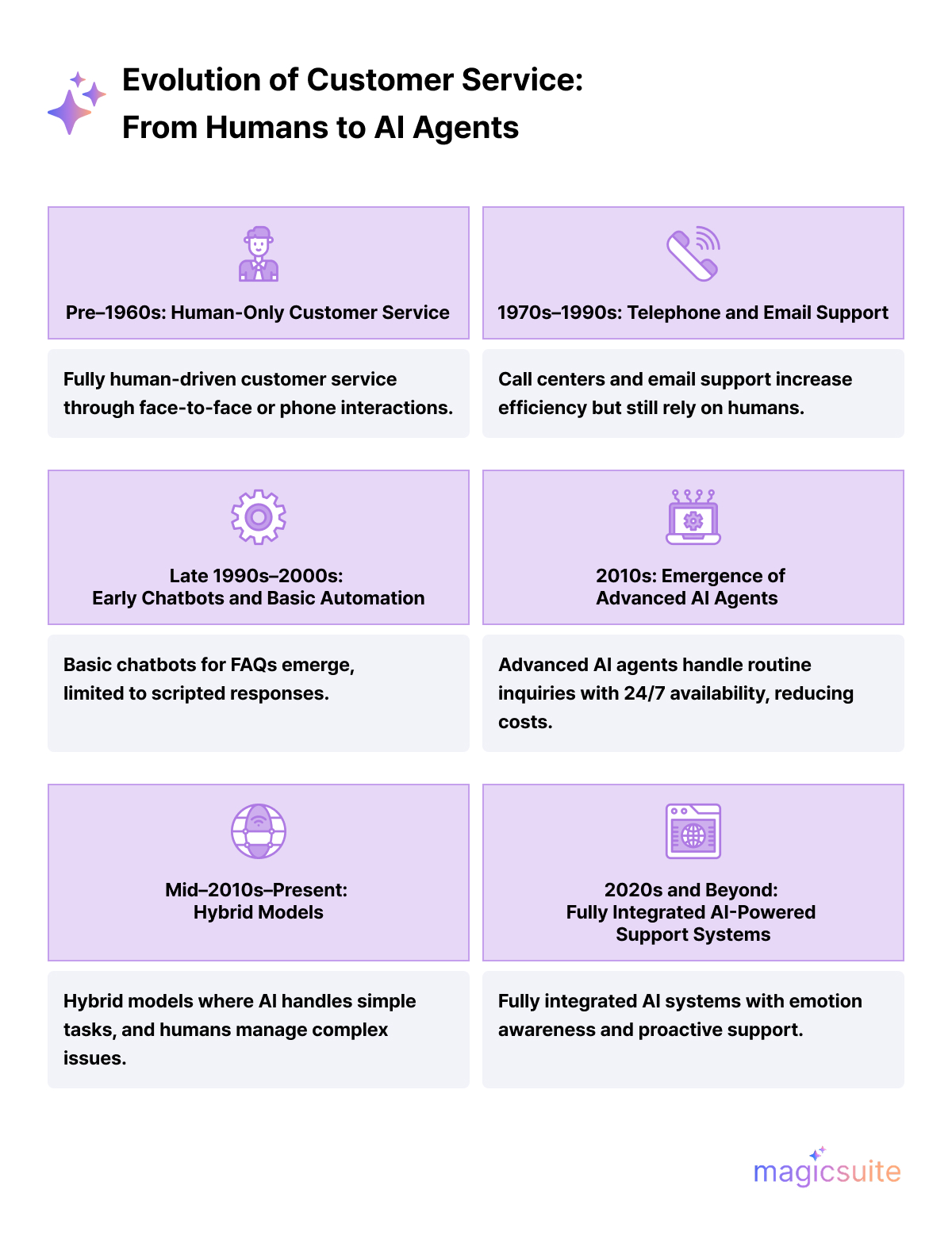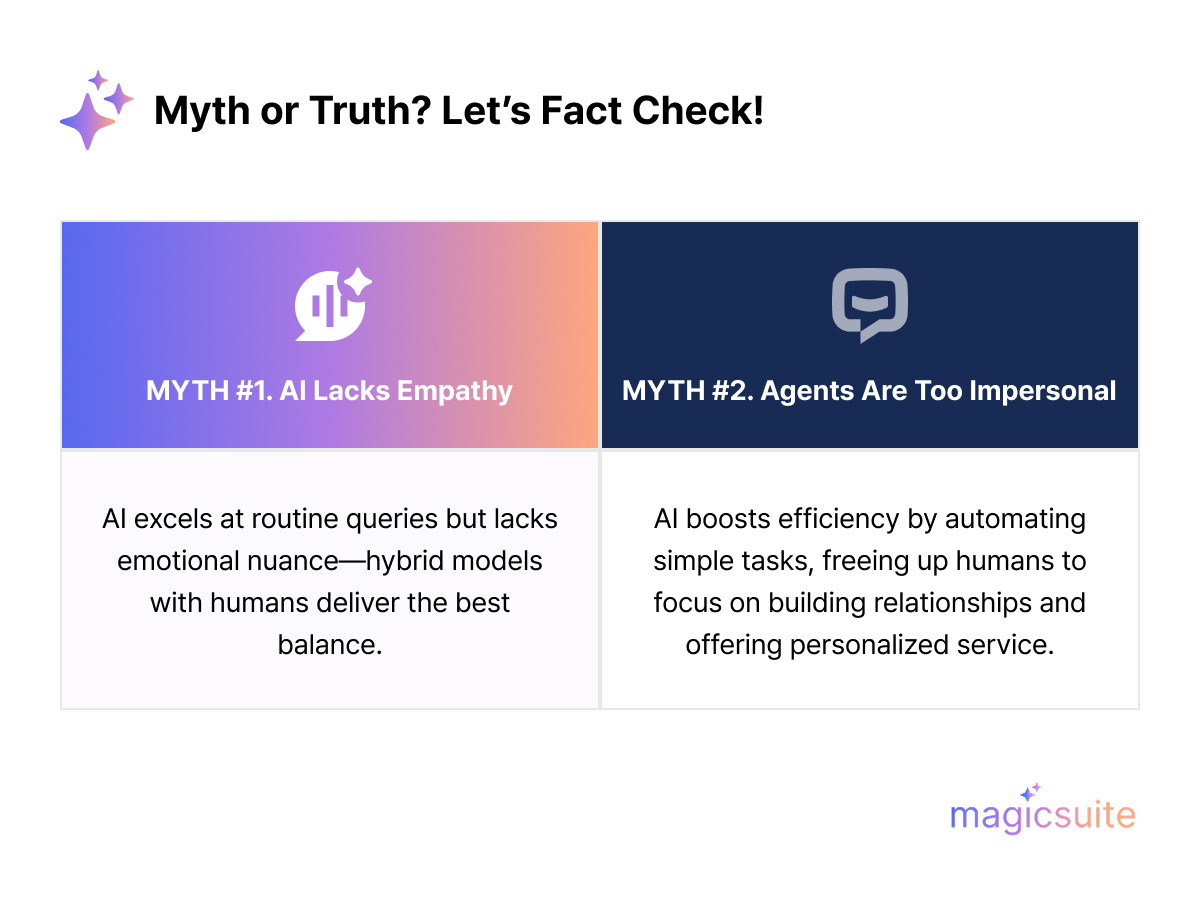Compare Customer Service Representatives vs AI Agents in efficiency, empathy, and resolution. Learn why hybrid models offer the best customer support experience.

Did you know that over 70% of customers prefer solving their issues via a live chat, yet 65% of them still report frustration with automated customer service systems? (Source: PwC, 2023)
This statistic highlights the growing gap between automation and human touch in the customer service world. AI agents, like chatbots and virtual assistants, are transforming customer service by offering quick, round-the-clock support at a lower cost. However, when issues get complex or emotionally charged, human customer representatives still offer unmatched value.
In this article, we compare AI agents and human customer service representatives. We'll look at trends, challenges, and opportunities, helping you decide the best approach for your business.
Customer Service Representatives (CSRs) are human professionals who engage directly with customers to address inquiries, resolve issues, and provide support. The role of a CSR has existed for as long as businesses have needed to communicate with their customers.
The early days of customer service were primarily face-to-face interactions or over the phone. But as businesses grew, the role expanded to include different media such as email, live chat, and social media.
Today, CSRs are highly trained individuals who can handle a variety of tasks, from simple inquiries to complex issue resolution. While technological advances have made certain aspects of customer service more automated, CSRs continue to be an essential part of complex, emotionally sensitive, or high-stakes situations.

AI Agents, or Artificial Intelligence-powered chatbots and virtual assistants, are automated systems designed to handle customer service tasks with minimal human intervention. The evolution of AI in customer service can be traced back to the mid-20th century, when the first computer programs aimed at natural language processing (NLP) were developed. However, it wasn’t until the early 2000s that AI technology became advanced enough to be utilized in customer service.
In the beginning, AI agents were simple, scripted bots that could answer basic questions. Over time, with machine learning (ML), NLP, and deep learning, AI agents can now handle complex inquiries, simulate conversations, and learn from interactions.
Today, AI agents are being used for everything from answering FAQs to providing product recommendations, handling transactions, and even offering emotional support in some cases.
There are several common misconceptions about AI in customer service:

With that being said, let's now explore the key differences between Customer Service Representatives and AI Agents, highlighting how each excels in different aspects of customer support and the unique strengths they bring to the table.
AI Agents offer Lightning-Fast Response Times. AI-powered chatbots can process customer queries in approximately 2.1 seconds, significantly faster than human agents. This speed is essential for businesses handling high volumes of routine inquiries. AI also offers 24/7 availability, ensuring that customers have access to support at any time.
Human Representatives are Slower but More Personalized. Human agents generally take 45 seconds or more to respond, depending on query complexity. However, humans excel in personalizing interactions and providing nuanced responses that AI cannot replicate. This is particularly important for handling complex or emotional situations, where a personal touch is essential.
AI Agents offer High Accuracy but Limited Problem-Solving Skills. AI agents boast an impressive 72% resolution rate for routine inquiries. They deliver consistent responses, reducing human error. However, they tend to struggle with more complex issues, such as those requiring emotional intelligence or creative problem-solving.
Human Representatives offer higher resolution rates for Complex Problems. Human agents have an 85% resolution rate, particularly for intricate or sensitive customer concerns. Their ability to interpret context and adapt their responses is important for handling situations that AI may not fully understand.
AI Agents offer Limited Emotional Understanding. AI systems fall short when it comes to providing empathy. The customer satisfaction (CSAT) score for AI interactions is typically 3.9 out of 5. AI agents can handle transactional queries, but they struggle with emotionally charged or complex issues that demand a human touch.
Human Representatives offer Stronger Customer Satisfaction Scores. Human agents, however, excel in this area, with CSAT scores of 4.5 out of 5. Their ability to read emotional cues and offer compassionate, personalized support enhances customer satisfaction, especially in challenging situations.
Also read What is MTTR: A Metric SMEs Can’t Ignore
AI Acceptance for Routine Tasks Is Well-Suited. AI is becoming more accepted for routine tasks such as password resets, FAQ responses, or simple queries. However, a significant portion of consumers still prefer to speak with a human agent when dealing with complex, sensitive, or high-stakes issues.
Human Preference for Complex Interactions. For many customers, especially those dealing with emotional or complicated issues, the human touch is irreplaceable. Adobe Commerce survey found that 67% of consumers would like to engage with a human when a situation requires personalized care.
AI Agents are More Cost-Effective. AI agents can reduce operational costs by handling routine inquiries at scale. Businesses can deploy AI systems without needing to expand their workforce as customer interactions increase. AI’s scalability makes it an attractive option for companies with fluctuating customer demands.
Human Representatives Involve Higher Costs and Scalability Challenges. While human agents bring a personal touch, they come with higher operational costs. Salaries, benefits, and ongoing training are significant expenses, especially when scaling to meet demand.
AI Agents have Limited Empathy. AI is not inherently capable of genuine empathy. Many AI systems are programmed to recognize basic emotional cues (e.g., frustrated or happy tones) but still fall short of truly understanding human emotions. As a result, AI can simulate empathy, but it does not truly "feel" or engage with customers in a meaningful way.
Human Representatives have Genuine Empathy. Humans possess emotional intelligence that allows them to interpret and respond to customers’ emotions in a meaningful way. This empathy is essential for situations where customers are upset, frustrated, or confused, as humans are better able to provide reassurance and compassionately resolve issues.
As AI continues to evolve, emerging technologies like Natural Language Processing (NLP), sentiment analysis, and predictive analytics will significantly enhance AI’s ability to handle more complex customer interactions. NLP, for example, enables AI to understand and respond to conversational language in a more natural, human-like manner.
AI’s growing capabilities mean that its role in customer service will continue to expand. Machine learning algorithms will make AI even more adept at solving complex issues so that AI systems can handle nuanced and multi-step problems more effectively.
Over time, AI will become more integrated into hybrid models, where it seamlessly supports human agents by handling routine queries and assisting with more complex ones.
Also check out 5-Star Customer Experiences: Top Customer Service Skills & AI
Here’s how a conversation might differ between AI agents and human representatives:

While both provide the necessary information, the human response adds a personal touch, demonstrating engagement and consideration.
Here are two examples of how businesses are using AI to transform their customer service operations.
Klarna: AI-Driven Customer Service Transformation
Klarna is a global leader in payment solutions. They’ve faced challenges with high customer service costs and slow resolution times, impacting efficiency and customer satisfaction.
Solution:
The company deployed an AI-powered chatbot to handle routine customer service inquiries. This chatbot managed two-thirds of customer interactions, automating tasks such as refunds, returns, and payment issues.
Results:
Comcast: Combining AI with Human Agents
Comcast's customer service agents needed support to handle complex queries efficiently without compromising service quality.
Solution:
The company introduced the "Ask Me Anything" (AMA) feature, an AI tool that provides real-time suggestions to agents during customer interactions. This hybrid model combines AI's speed with human empathy.
Results:
Can AI agents replace human customer service reps entirely?
AI agents can handle routine inquiries, but human agents are essential for complex or emotional situations that require empathy and nuanced problem-solving.
What are the limitations of AI in customer support?
AI struggles with emotional intelligence, complex problem-solving, and scenarios requiring high-level creativity or empathy.
How does AI compare to live chat agents?
Live chat agents, which may include AI-powered chatbots, can be used for simple queries, but human agents are necessary for handling more intricate or sensitive issues.
MagicTalk is an AI-powered solution that automates responses to common inquiries, while seamlessly escalating complex issues to human agents for personalized support.
Try MagicTalk today and experience the future of hybrid support! Try it now for free!
AI agents and human customer service representatives each bring unique strengths to the table. While AI offers efficiency and cost-effectiveness, human agents are incomparable when it comes to empathy, complex issue resolution, and personalized support.
So, it is safe to say that the future of customer service lies in hybrid models that combine the best of both worlds, enhancing both operational efficiency and customer satisfaction.

Luke is a technical market researcher with a deep passion for analyzing emerging technologies and their market impact. With a keen eye for data and trends, Luke provides valuable insights that help shape strategic decisions and product innovations. His expertise lies in evaluating industry developments and uncovering key opportunities in the ever-evolving tech landscape.